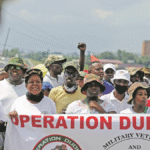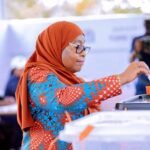Botswana, known for its small population and rich diamond resources, is gearing up for a pivotal general election this Wednesday. The Botswana Democratic Party (BDP), which has governed the nation since its independence in 1966, is facing a critical moment as it attempts to reframe its image by adopting a term typically associated with opposition factions: “change.”
In a bid to connect with voters, President Mokgweetsi Masisi, who has held office since 2018, states in the party’s manifesto, “Let’s change together and build prosperity for all.” This declaration reflects an acknowledgment of the need for change in governance, despite opposition claims that the BDP lacks the capacity to implement such changes effectively.
Masisi is vying for a second term against three challengers, including Duma Boko from the opposition coalition Umbrella for Democratic Change (UDC), Dumelang Saleshando of the Botswana Congress Party, and Mephato Reatile of the Botswana Patriotic Front, who is backed by former President Ian Khama. The upcoming election is expected to be competitive, although analysts suggest that the divided opposition may inadvertently bolster Masisi’s chances.
Despite being one of Africa’s top diamond producers, Botswana has faced economic challenges due to a downturn in the diamond market, leading to reduced revenues. The nation’s small population of approximately 2.3 million enjoys free healthcare and education, contributing to a generally stable socio-economic environment. However, critics accuse the BDP of long-term economic mismanagement and corruption a charge the party vehemently denies.
Masisi, addressing concerns over economic performance, stated during a recent presidential debate, “Our diamonds have not been selling since April, so yes, our revenues are down, but the economic fundamentals still remain intact.” He emphasized his commitment to ongoing projects aimed at enhancing wealth for the citizenry, highlighting a recent deal with diamond giant De Beers, which is expected to increase Botswana’s share of rough diamonds.
The economic landscape remains a key issue in the election, particularly rising unemployment, which hovers around 28%. Boko criticized Masisi’s handling of the economy, asserting, “It is not acceptable that a country such as ours, which is the fifth richest per capita in Africa, still has so many people living in poverty.” Boko has promised significant wage increases and enhanced social grants, proposing to fund these initiatives by cutting wasteful government expenditures.
While the BDP retains a substantial majority in parliament, having won 38 out of 57 contested seats in the last election, its popularity appears to be waning. The UDC secured 15 seats, but analysts note that the opposition suffers from a lack of funding, creating an uneven playing field. Ringisai Chikohomero from the Institute for Security Studies remarked, “The playing field is not even,” emphasising the challenges facing opposition candidates.
The last election was marred by claims of fraud, with the opposition challenging the results in court only to have the case dismissed. As the election approaches, all eyes will be on Botswana to see if the call for “change” resonates with the electorate or if the BDP will continue its long-standing rule in this diamond-rich nation.










